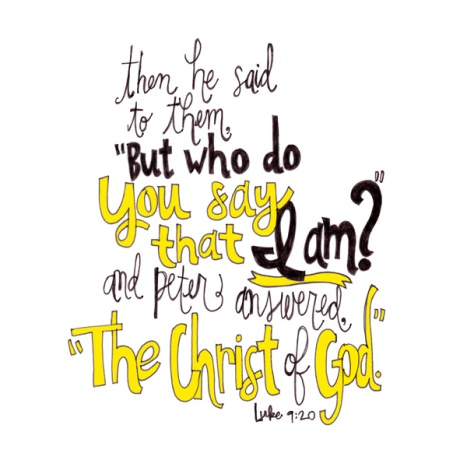I like to find a quiet place to pray, as there are fewer distractions. I can compose myself better and it seems there is a better chance that I can “hear” Jesus. That’s where the Disciples find themselves today, alone, in a quiet place with the Lord.
Jesus asks them a question: “Who do the crowds say that I am?” Many in Israel recognized Jesus as a mighty man of God, even comparing Him with the greatest of the prophets. I sometimes think, Lord, that if I had been around in your day I would have recognized who you were. I tell myself how easy it would have been to believe if I had seen you at work. How wrong I am! Even-the people who were with you, who witnessed your miracles, who heard your voice and saw your face, could not agree about who you really were. Not even Peter understood fully your mission from the Father, the real reason for your coming.
Before Jesus asked His disciples: “Who do you say that I am?”, He asked: “Who do the crowds say that I am?”. Jesus did this to show we must separate ourselves from the crowd if we are to truly acknowledge Him as the Messiah, Lord, and God. Crowd-pleasers aren’t God-pleasers. Jesus is not popular; He is a “sign of contradiction”. The crowd took part in crucifying Jesus, and it hasn’t changed. Therefore, we are enemies of Christ and His cross if we are a crowd-pleaser, set on the things of the world, those things the crowd has always run after. Believing in Jesus means not being part of the crowd, which means suffering as Jesus suffered. Don’t get crowded out of life in Christ. It’s better to be persecuted by the crowd than to be persecuting in the crowd. Follow Jesus; leave the crowd behind.
” ‘But you — who do you say that I am?’ He asked them.” —Luke 9:20
In prayer and in our lives how do we reply? If we answer as Peter did: “The Christ of God”, we’d better also think of the cost: “The Son of Man must suffer greatly”. Jesus doesn’t want us to just tell others who He is, but rather to know Him in our hearts and to see Him in our daily lives and to live as He lived no matter what the cost. “There is an appointed time for everything.” Now is the time for the Lord
Peter, always quick to respond whenever Jesus spoke, professed that Jesus was truly the “Christ of God”. No mortal being could have revealed this to Peter, but only God. Through the “eyes of faith” Peter discovered who Jesus truly was. Peter recognized that Jesus was much more than a great teacher, prophet, and miracle worker. Peter was the first apostle to publicly declare that Jesus was the Anointed One consecrated by the Father and sent into the world to redeem a fallen human race enslaved to sin and cut off from eternal life with God .
If suddenly you were taken away to a totally non-Christian environment, with no churches, no family, no friends, no expectations, would you still worship God daily? Would you keep holy the Lord’s day? Would you obey the commandments? Would your relationship with Jesus remain?
What if it cost you your job to be a Christian? What if you didn’t get anything out of Church or even Christianity? Would you still be faithful because of your relationship with Him?
Eventually, only one question remains. Family, Church, upbringing, culture, and doctrine fade into the background. We can’t live forever on what others say about Jesus. We must have our own personal relationship with Him. On the last day, judgment day, Jesus will not ask us who do people say that He is. He will ask the only question that counts: “Who do you say that I am?”.
Lord, may I never be satisfied with simple answers to ‘Who do you say I am?’ As soon as I think I have the answer, I can be sure that I’m wrong, because no words, however many or however learned, can sum you up. You call me to keep searching for the real you, to keep listening for what you say of yourself.
Filed under: Daily Reflection on the Mass readings | Leave a comment »











